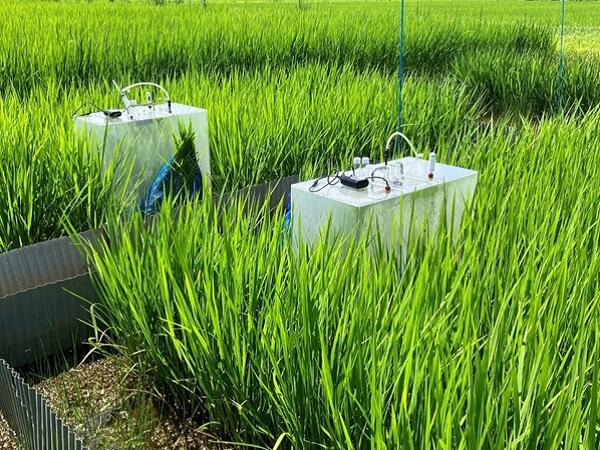The research project M4NCO "Microbe mediated methane mitigation, nitrogen cycle optimization," led by Professor Tomoyasu Nishizawa of the Faculty of Agriculture at Ibaraki University will receive a research grant of approximately 3.83 million U.S. dollars or approximately 500 million Japanese yen from the Bill & Melinda Gates Foundation. Nishizawa's research group works with universities and research institutions in India, Colombia, and Germany.
Amid growing global environmental concerns, COP28 held in December 2023 emphasized the need for collaboration in the sustainable development of food and agriculture sectors and the strengthening of measures to combat climate change. The global warming potential of methane, a greenhouse gas, is approximately 27-fold higher than that of carbon dioxide, and approximately 40% of methane emissions from ecosystems comes from the agricultural sector, including rice paddy fields and livestock farms. Traditional wet-rice cultivation, which is a major source of methane emissions, is popular among small farmers in regions such as Southeast Asia, South Asia, and Latin America. Measures against climate change require farmers in these regions to adopt new technologies, such as improved varieties, advanced irrigation systems, and upland rice cultivation. However, these are very challenging tasks due to costs and other factors. Consequently, the use of microorganisms is attracting attention as a potential solution.
A study conducted by Assistant Professor Midori Sakoda, who works on the project with Professor Nishizawa, and her colleagues, has confirmed that the community structures of methane-producing (methanogenic archaea) and methane-consuming (methanotrophic bacteria) microbes in rice paddy field soil change to low methane-producing/high methane-consuming types during rice cultivation using seeds inoculated with a bacterial strain called KH32C. The study has also confirmed that methane emissions are reduced by about 20% under both no fertilization and nitrogen fertilization conditions while maintaining rice yields.

Provided by Ibaraki University
The research project plans to demonstrate the effects of introducing plant growth-promoting microorganisms, such as KH32C, into rice cultivation systems on reducing methane emissions and storing nitrogen in the soil under diverse conditions in Asia and Latin America over the next 3 years. Through this project, they will gather evidence about various aspects of the technology, including the simplicity of introducing the technology and the low environmental impact of the inoculated microorganisms that do not grow in the soil. They will also promote the spread of these technologies while training young researchers and engineers. The project aims to reduce global emissions of methane, which is emitted as greenhouse gas, by at least 3% (24 million tons of CO2 equivalent per year).
Nishizawa said, "When we were looking for technology conversion and implementation for rice cultivation in Japan and other Asian countries, our research caught the attention of the folks at the Bill & Melinda Gates Foundation and was selected for funding. This grant brings us much closer to achieving our goal of reducing greenhouse gas emissions. I would like to express my appreciation and respect for the foundation's efforts to identify the seeds of scientific innovation in global research and support the generation of high-level evidence for societal advancement."
Journal Information
Publication: Microbes and Environments
Title: Mitigation of Paddy Field Soil Methane Emissions by Betaproteobacterium Azoarcus Inoculation of Rice Seeds
DOI: 10.1264/jsme2.ME22052
This article has been translated by JST with permission from The Science News Ltd. (https://sci-news.co.jp/). Unauthorized reproduction of the article and photographs is prohibited.




